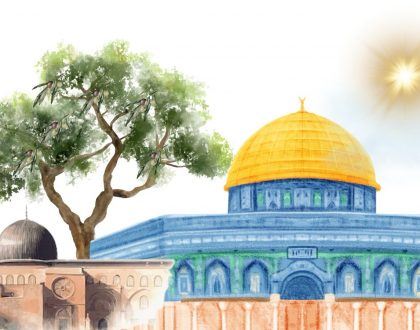Malcolm X
by Ayesha Khan
Malcom X was described by his biographer as the ‘most electric person’ I ever met.
He is someone whose autobiography is gripping and fascinating because he jumps off the page and you can almost imagine this 6 foot 3 man climbing out of the book and filling the room.
He described himself as the angriest man in America and reporters claimed that ‘he was the only Negro in America who could either start a race riot or stop one.’
Malcolm is born in 1925, in America – a country that had finally abolished slavery only 60 years before his birth.
But after hundreds of years of exploiting black people, black people had not just lost all sense of their identity and language but been abused and treated badly for so long that it seen as normal to treat them and think of them as inferior.
While discrimination was more blatant in the south, in the north, white people preferred to live in white only suburbs.
Where Malcolm lived there were areas where black people were not allowed to go, and ‘successful’ black people were waiters and boot polishers. Blacks found it hard to escape the ghetto, and to get good jobs, so they trapped in acute poverty.
To get an idea of what Malcolm become later, we need to look back to his childhood. This has a profound impact on shaping him.
Malcolm’s father, who was a Christian minister and had received threats from the Ku Klux Klan and other racist organisations
When he was only a small child, Malcolm awoke one night in a frightening confusion of pistol shots, shouting and smoke and flames. He said ‘we were lunging and bumping and tumbling all over each other trying to escape. My mother with a baby in her arms just made it into the yard before our house crashed in showering sparks. I remember we were outside in our underwear yelling our heads off.’
From then on, instead of feeling protected, they felt harassed by the police.
Constantly under threat by a racist organisation called the Black Legion, they moved home twice, but the white supremacists finally succeeded in the brutal murder of Malcolm’s father.
They were due to receive a payment from his life insurance policy, but the insurance company don’t pay out the compensation that is due to them, and his mother didn’t like accepting charity and struggled to make ends meet for her six children, so she began to get into debt. She would get jobs because she looked white but when people discovered she was black she would lose them.
They sank into unbearable poverty, with Malcolm squabbling with his brother and dizzy with hunger. He started petty stealing. The welfare people wanted to split up the family and send the children to foster homes.
His mother finally suffered a complete breakdown and ended up in an asylum. He said, ‘I truly believe that if ever a state social agency destroyed a family it destroyed ours.’
He got expelled from school when he put a tack on his teacher’s chair, and was sent to detention home and reform school. Given stability and food, he did well. He was liked at the home by the white family and was considered so good he was sent to an almost all-white school. He was so bright his grades were the highest in the school, and so charismatic that he even got elected as class president. He was over the moon.
But one day, when he was in 8th grade his life changed. His teacher encouraged the white students who were not as bright as him in the class to aim high in life. He said he wanted to be a lawyer, and his teacher said, ‘You’ve got be realistic about being a nigger, you need to think about something you can be. A lawyer, that’s no realistic goal for nigger.’ And he suggested he become a carpenter instead.
Feeling his aspirations crushed, this had a profound impact on him. ‘It was then that I began to change-inside. Where the word nigger had slipped off my back before, wherever I heard it now I stopped and looked at whoever said it.’ Even the Swerlins, the nice couple who looked after him, talked about black people as ‘niggers’ in front of Malcolm, as if he was a pet canary who couldn’t understand.
Everyone noticed the change in him, and finally the Swerlins asked him to leave. He wrote to his step sister Ella to ask if he could go live with her in Boston. Age 14, the boy who had the intelligence and personality to be class president became a drop out.
He arrived in Boston looking like a complete bumpkin with his clothes too short for him, but he immediately started exploring, and got himself his first job as a shoeshine boy, then waiter, and as he looked much older than he was, he managed to get a job as with the railways, washing plates.
This enabled him to get to New York. Here he discovered Harlem – the black ghetto. ‘Dirt, garbage cans overflowing, or kicked over, drunks, dope addicts, beggars. Sleazy bars, greasy restaurants, crawling with everything illegal and immoral.’ He was mesmerised by it.
He bought himself a zoot suit and got his hair conked. He would be parading around in his zoot suit with his white girlfriend. He started drinking, doing soft drugs and having a wild time. He got fired from his job as he is too loud, rude and drunk. He went to visit Mrs Swerlin in his grey zoot suit, four-inch pearl grey hat and conked fire red hair. She was utterly shocked. He had only just turned 17.
He got a job working in a bar and absorbed that whole environment. He started gambling, doing hard drugs and eventually got involved in dealing drugs, prostitution and armed burglary. It wasn’t long before he got caught. (He was aged 21 and he hadn’t even started shaving).
He was sentenced to jail for 10 years.
Even there he was buying drugs and betting, and he got the name ‘Satan’ because he was so anti-religious. Then another inmate suggested he do a prison correspondence course. He had forgotten anything he had ever learnt at school and could barely read the picture postcards his sister had sent. He taught himself to read by first studying a dictionary and learning all the words, and then started to read history and philosophy.
Two years later, he got a cryptic letter from his brother saying ‘Malcolm don’t eat anymore pork and don’t smoke any more cigarettes. I’ll show you how to get out of prison.’ He stopped that day thinking it was some sneaky way to escape. Finally, his brother Reginald arrived and told him that his family had converted to Islam and told him that he should become Muslim too.
However but they had actually become followers of an organisation led by someone who preached that the white man is the ‘devil’ and that all the degradation of black people has been because of this. ‘You don’t know your true family name, and knowledge of your own kind and to hate everything that is black including himself.’
When Malcolm thought back and reflected over his life, he came to the conclusion that all his problems had stemmed from the inequality and discrimination that he and other black people faced. He dropped the ‘slave name’ and adopted the surname ‘X’. By the time he was released from prison in 1952, he had given up all the vices he had had. He never turned back to any of the bad habits he had had, and became a passionate follower of this cult.
Malcolm began to rescue people out of the ghettoes and help them kick their smoking, drinking and drug habits. He spoke their language and had lived that life, so could understand everything they were going through and appreciate that that lifestyle was not going to help them.
He campaigned relentlessly against injustice and oppression of black people. He became increasingly famous and increased the membership of the nation of Islam from about 400 to 40,000. He was attracting huge crowds and would speak at universities and in debates.
He felt a lot of anger against white people for how they treated black people, and for 12 years he advocated racism against white people. He was constantly receiving negative press coverage and was portrayed as a figure who incited hatred. During this time, he got married to devout lady called Betty and had 4 daughters.
In 1963, Malcolm had become disillusioned by the Nation of Islam, and began to realise that they were not preaching True Islam.
He felt that the way forward for black people lay in uniting them. He said, ‘substantially the organisation I hoped to build would differ from the Nation of Islam in that it would embrace all faiths of black men, and deliver an action program that would eliminate the political oppression, economic exploitation and social degradation suffered daily by 22 million African Americans.’
He recognised that while ‘the black race needed to get up off its knees and to get on its feet and get rid of its scars and to take a stand for itself,’, that anger can blind human vision.
This is an important lesson for Muslims today. If we look back over Islamic history, it is peaceful with different religions coexisting harmoniously. It is only since Muslims have been colonised and oppressed that people have sought violence to solve their problems.
It is only since the Second World War that violence has emerged. And much of the violence associated with Muslims today is like the Black Anger crying out for justice, or the result of organisations who give themselves the title of Islamic movements but who are preaching the exact opposite of Islam and giving Muslims the image of being crazy fundamentalists.
In fact, this is against the very essence of Islam, which advocates goodness. Its very word for hello means ‘peace’.
Malcolm eventually realised this himself when he went on Hajj to Makkah. Here he experienced the journey of a lifetime and gained clarity in his vision when he saw Muslims of colours come together in a spirit of brotherly love. ‘They were of all complexions, the whole atmosphere was of warmth and friendliness. The feeling hit me that there wasn’t really any colour problem here. The effect was as though I had stepped out of prison. … That morning was the start of a radical alteration in my whole outlook about ‘white’ men.’
He said America needed to understand Islam, because it is the one religion that erases from its society the race problem. On this pilgrimage, what he saw forced him me to rearrange much of his though patterns previously held, and to toss aside some of his previous conclusions.
He declared ‘I am for justice, no matter who it is for or against. I’m a human being first and foremost and as such I’m for however and whatever benefits humanity as a whole.’
‘I don’t speak against the sincere well-meaning good white people. I have learned that there are some. I have learned that not all white people are racists.’
‘True Islam taught me that it takes all of the religious, political, economic, psychological and racial ingredients or characteristics to make the Human Family and the Human Society complete.
My friends today are include all kinds, some Christians, Jews, Buddhists, Hindus, agnostics, and even atheists. My friends today are black, brown, red, yellow and white!’
He continued on to visit several countries, including in Africa, where he was hugged and besieged for autographs. He stressed the kinship between Africans and their brothers and sisters, the African Americans.
Two years later, just as when he was a child, Malcolm’s house was burned down. This time, a terrifying blast in the early hours of the morning awakened him and he scrambled out of his house with his pregnant wife and screaming, frightened children. Yet again his house had been burned down by racists, except this time they were likely to be black racists.
A few days later, he was about to address an audience in Harlem, when he was shot and suffered 21 gunshot wounds to his chest. Malcolm X died in 1665. He had not even turned 40.
He had always felt that like his father, his life too would be curtailed and that there were many people who wanted to kill him. His family were left homeless, his daughters fatherless, and his youngest twins were born after his death.
Malcolm X fought for civil rights alongside Martin Luther King, and secretly felt that his angry noise would make King’s peaceful fight easier. He was also good friends with Muhammad Ali, who
embraced Islam and refused to fight in the Vietnam war on the grounds they had done nothing wrong to him, so why should he?
The story of Malcolm X is an amazing one. It is fascinating for so many reasons.
It is the story of an individual who starts off as a victim of racism in society, who has so much to offer but is not given the opportunity to develop his potential.
Who loses his way, then sinks to utter depravity but then not only lifts himself out of it, kicks all his bad habits, turns himself around and finally champions the cause of his entire race.
It’s the story of a man who can barely read, but who is self-taught and can pull crowds of 10,000s people when he speaks.
It is the story of someone fighting for the rights of black people not to be despised and treated inhumanely when ideas about black people were deeply ingrained in society.
It also brings to light so many lessons in Islam:
As human beings we have tremendous potential. Man has the ability to be the best of creation and also the worst.
It is through our choices that we determine our fate. In the Quran we are told that every bad action you do, facilitates further bad actions and sins.
So every good deed you do opens that door for other good deeds, but when you start to sin, you not only increase in sins, but you take others with you and your sins start to not seem so bad.
We have to look after our bodies and souls and protect them from harm. Everything we do to harm our bodies – smoking and drinking also has an impact on our souls.
If we make mistakes it’s not the end of the world. Even when Malcolm is at his lowest, he is not beyond redemption. It is up to us to evaluate ourselves and see where there is room for improvement.
In Islam we are taught the importance of having ‘good’ company, because it is like being surrounded by fragrance or stench, whatever you surround yourself with will inevitably permeate from you.
And similarly we are told that we have to encourage good in others and discourage bad. It’s not acceptable to close our eyes and let bad things happen around us.
We are taught to fight oppression even if the perpetrators are Muslims. We are told to stand up for the rights of others and not to allow ourselves to be treated unfairly.
All are equal – Islam advocates social justice. It is not just a matter of race, because we know in Islam that we have all been in created equal, but it is also the obligation of the well off to look after the poor.
Non-violence – Islam is a religion of peace. There were times in his life when Malcolm X advocated violence but in Islam there is no justification for using violence against innocent people at any time. You are allowed to defend yourself, but not to attack anyone.
Even today, we have organisations like the Nation of Islam which try to hijack Islam and create the impression that Islam is violent. But that is completely against the spirit of it.
Written by Ayesha Khan in 2012
Recommended Posts

Masjid al Aqsa – why it has a very special place in our hearts
November 29, 2023

Palestine: The Holy Land
November 23, 2023

